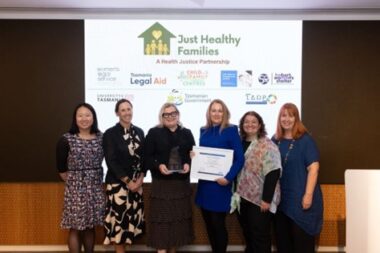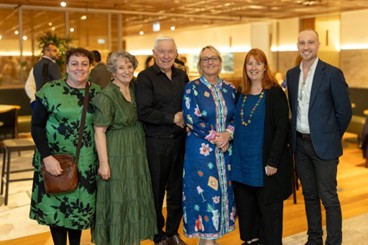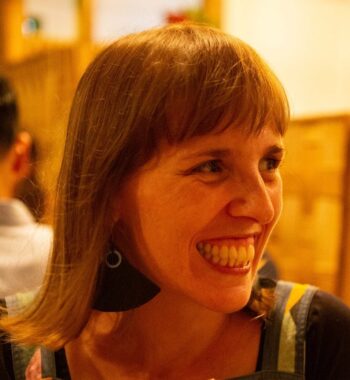ANZ – PBA Partnering Awards winner announced
Earlier this year, PBA let our networks, Associates and alumni know that we had partnered with ANZ Bank in Australia to establish and launch inaugural Partnering Awards – which were designed to raise awareness in Australia, of the importance of attention to good partnering processes in cross-sector partnerships in support of delivering important social change outcomes.
The Awards attracted an outstanding group of cross-sector applicants from across Australia, and four finalists were identified by the judging panel, who were drawn from experienced PBA Associates and accredited PBT alumni: Kate Hayes, Cam Willis, Cath Scarth, Trish Edwards, Ingo Kumic and Michelle Commandeur. The judging panel was co-convened by long-time Julie Mundy and Helen Fenney, who guided the judges through a rigorous judging process, jointly developed by ANZ and PBA, which considered the PBA partnering principles amongst other criteria. Of all the principles, applicants spoke most convincingly to that of ‘courage’ and how they had had to operate outside their comfort zones to do things differently in order to succeed together.
Just Healthy Families (JHF), a health justice partnership embedding free legal help into health and social service settings across Tasmania, was announced as the recipient of the inaugural ANZ-PBA Partnering Award. The JHF initiative aims to co-locate lawyers with health professionals, to ensure lawyers are routinely in the right place at the right time when clients need assistance from their trusted health or social service provider. The JHF partnership is a collaboration between two legal services (Women’s Legal Service Tasmania and Tasmania Legal Aid) and three health and community partner organisations (Child Health and Parenting Services, Child and Family Learning Centres and Hobart Women’s Shelter) as well as the University of Tasmania and Tasmanian Government. In receiving the award, the JHF partnership will also be given professional development opportunities with PBA, up to the value of $6,000 (incl. GST).

ANZ’s Janet Liu, the Just Healthy Partnerships representatives, PBA’s Julie Mundy.
The Women’s Legal Service Tasmania CEO, Yvette Cehtel said: “This project is a Tasmanian first, approached in a truly innovative way. We asked lawyers to step out of their comfort zones and try something new. As partners, we’re honoured to have our vision and work celebrated through this Award. Together, we know we can continue to achieve positive outcomes for the over 3,000 women we’ve assisted throughout the life of this project.”
PBA Associate, Julie Mundy said: “We received some impressive applications from a range of sectors. Just Healthy Families demonstrated a strong culture of openness between partners with the co-location of the JHF lawyers within the health services in order to enable vulnerable families to access their services in a trusted environment. The success of the program, in turn has helped build trust between partners who could see first-hand the impact the service had on clients.”
Other finalists for the award were partnerships established by Our Watch and Victoria University (Prevention of Gender-based Violence in tertiary education settings ), Inland Rail, TAFE NSW, Clontarf Foundation and Martinus Rail (First Nations Skills Development & Training), and Justice Connect and Telstra (Building Digital Inclusion and Legal Resilience).
ANZ Head of Social Impact and Community, Janet Liu said: “The ANZ-PBA Partnering Award was established to recognise effective cross-sector partnership practice in Australia. ANZ and PBA believe good partnering practice can lead to transformative change and sustainable relationships, ultimately delivering long term benefits for the Australian community.”
The Awards night was hosted spectacularly in late October by ANZ at their headquarters, and was well-attended by over 100 decision-makers and partnership practitioners. Ian Dixon, one of the pioneers of cross-sector partnering in Australia and a key PBA Associate over many years, was kind enough to emcee the event and shared his experience of partnership brokering over the career. Two of the judges, Cath Scarth and Cam Willis, also shared their insights from the judging and their own brokering experiences, on the night. It was great to see a good turn-out of Australian PBT Alumni, Associates and trainers at the event, who rarely get the chance to gather and celebrate.

Some of the PBA crew in attendance: Yeshe Smith, Dianne McLay, Ian Dixon, Michelle Halse, Julie Mundy and Cam Willis.
It has been a wonderful experience forging the partnership with ANZ and working together to design and deliver the inaugural Awards. It seems fitting too that the cross-sector Awards are delivered by a cross-sector partnership! We very much hope that the Awards will continue and flourish from here on. Our next steps are to undertake a reflection to see what we have learned along the way and consider what we would do differently. Cam, Julie and Michelle will also be working to synthesis some learnings from the first year’s applications which we plan to share more broadly in the coming months.
For further information about the Awards, please feel free to contact Julie Mundy juliepmundy@gmail.com
 If you’ve ever worked in the development industry, you may have felt a sense of unease about the power dynamics at play. This month, in our
If you’ve ever worked in the development industry, you may have felt a sense of unease about the power dynamics at play. This month, in our 
